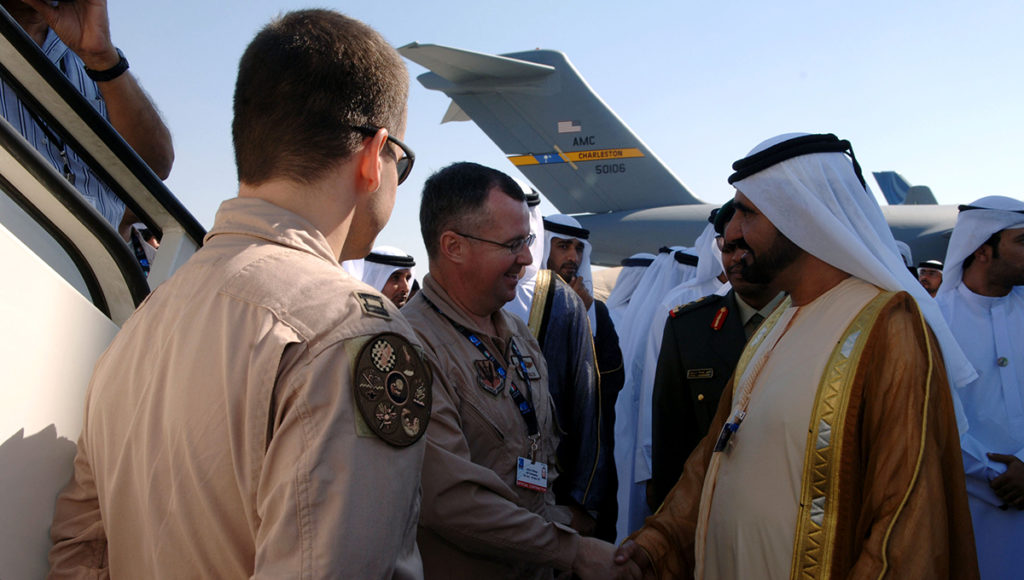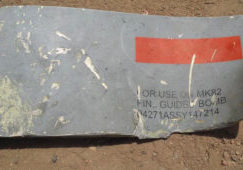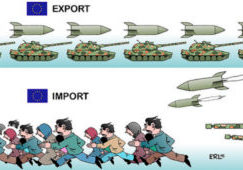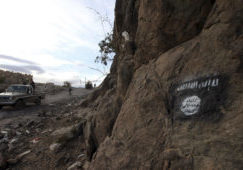Crown Prince of UAE has an Army of Private Military Contractors

Antony Loewenstein: War crimes are rampant among military contractors – they work off the books, work that is illegal and with much looser rules of engagement. Who are they accountable to?
SHARMINI PERIES: It’s The Real News Network. I’m Sharmini Peries, coming to you from Baltimore.
The United Arab Emirates is a very small country with a population of 9 million people. It has recently transformed its military to a mercenary army of foreign nationals. UAE is a Gulf oil producer, so it has the resources to hire its military, including former military officers from other countries, to train and lead troops that are also hired from other countries such as the Philippines, Sri Lanka, India, and Pakistan. Middle East Eye recently wrote that the head of the UAE’s presidential guard is the Australian Mike Hindmarsh, and that commander of UAE’s joint aviation command is an American general, Stephen A. Toumajan.
STEPHEN TOUMAJAN: My name is General Stephen A. Toumajan. I’m the commanding general for the Joint Aviation Command in UAE. My personal view is that this training here at NTC is actually harder than it is in combat. I told my guys when I come here, there’s no other training area like it in the world, where you want to make mistakes and you learn from your mistakes. You take those back and teach your other units all the TTPs that you learned here in a simulated combat zone, where you’re combat 24/7. You know, when you get to a real combat zone your enemy is not, usually not attacking you every single day, every hour, like they are here at NTC. We’ve been trying a long time to get our guys here. We’re very successful, very proud to be the first aviation force to come here.
UAE’s a small country. We don’t have the landmass that you have for these type of training events. So we truly appreciate the hospitality that you’ve shown United Arab Emirates and to my soldiers across the entire spectrum, from the time we deployed here to the, all the way to the end of the combat zones.
SHARMINI PERIES: Now, the UAE’s mercenary forces are not just optics. It is conducting serious military missions. Last week, UAE delegation visited Israel to observe the deployment of the U.S.-made F-35 [stealth] fighter bomber, although Israeli sources deny this.
UAE forces are actively participating in the war in Yemen, and Amnesty International is calling for an investigation into allegations of torture in UAE detention facilities in Yemen. If you reflect back a bit here, the U.S.’s wars in Afghanistan and Iraq brought the idea of private military and security companies not only into existence, but into extensive use. Now, is the UAE’s privatization of its military an extreme case, or is this the new norm? This is particularly problematic with the new formation that has come about, the U.S. and Sunni alliance of the Gulf States and Israel. Also another important factor to consider here is that the former Blackwater CEO Erik Prince, who made a fortune in Iraq through his private security forces and contractors for the U.S. military, now after being exposed for his horrendous acts of aggression and human rights violations through his company, he picked up and moved his shop to Dubai, the capital of UAE.
On to talk about all of this with me is Anthony Lowenstein. He’s an independent journalist and author of Disaster Capitalism: Making a Killing out of Catastrophe. And he’s also a writer, producer, and journalist, and he also produced the film Disaster Capitalism. Thank you so much for joining us, Anthony.
ANTHONY LOEWENSTEIN: Thank you for having me.
SHARMINI PERIES: Anthony, let’s begin with you sorting out for us this relationship between the economic interests of retired generals and private military companies and contractors who are often trying to make a salary, a hefty salary, actually, after being in the military, and the geopolitical interests of this new formation between the U.S., the Sunni alliance of Gulf states, and Israel.
ANTHONY LOEWENSTEIN: So before 9/11 there was something called military contracting, and certainly the U.S. utilized these kind of things in various conflicts. But 9/11 changed the map. The Bush administration and the Obama administration, and now certainly the Trump administration, has massively accelerated the use of contractors. So that meant, for example, that when the Bush administration went to war in Iraq and Afghanistan huge numbers of contractors were working. And some of the contractors weren’t mercenaries. Some of them were literally just doing menial tasks.
But where this became deeply problematic and a complete lack of accountability, you mentioned Blackwater and Erik Prince, that was the most egregious example of that. Basically they were often doing work the U.S. military did not want to do. In other words, work that was either off the books, work that was either illegal, work that had much looser rules of engagement than, say, the U.S. military. And it’s not like the U.S. military is particularly accountable when there are various alleged war crimes committed in Iraq or Afghanistan, either. But certainly when former U.S. military contractors were working for a range of companies, Blackwater and others, what you found, often, was a complete lack of any kind of transparency about what they were doing and how they were doing it.
Fast forward to the present day. Now, what UAE is doing in some ways is relatively new. But at the same time it’s only unique because of its relatively small size. So the U.S. in some ways has been a leader in privatizing elements, not so much of its own military, but using almost sort of shadow military forces to either, as I said, do jobs around the world that can be anything from assassination, kidnapping, rendition, there’s huge amounts of examples of these forces doing that. In the UAE, particularly in Yemen, what’s been very worrying is that the private military contractors that are being used are often American or Australian. There’s no real interest from the Americans or the Australians, as far as we can tell, to actually care what the men and women are doing. In other words, there’s a sense because the UAE is an ally, because these countries support the war against Yemen, which I might add is the worst humanitarian crisis currently in the world, that somehow these foreign military contractors can get away with doing whatever they want.
And there’s been a lot of reporting in Australia, my birth country, of the gentleman you just mentioned, Mike Hindmarsh, who’s a former senior general in the Australian military who operated in Iraq after the 2003 invasion. His role in Yemen is, and the UAE military, I might add, is deeply unclear. No one quite knows exactly what he’s doing. Clearly there are elements of accountability questions here. And there’s been serious questions also raised about whether someone like Hindmarsh, if and when the UAE military commits war crimes in Yemen, and the evidence for that is overwhelming, why shouldn’t someone who is a leader of that military face justice and accountability for that, whether they are from the UAE, or Australian, or American? And that so far has not been pressed in international court.
SHARMINI PERIES: Now, Anthony, the U.S. Defense Secretary Jim Matthis, who apparently advised the UAE military before he joined the Trump administration, now, with all of the issues that one could speak to in regard to General Matthis’ history, he is considered one of the more respected generals in the U.S. military. Now, if such high-ranking officials in the U.S. military is advising foreign governments, and we have this situation now where we have Saudi Arabia, U.S., and Israel forming this alliance in the region to respond to issues in the region, how can you separate these contracts from their geopolitical positions of these states?
ANTHONY LOEWENSTEIN: I don’t think we can. And I think what’s interesting in the last years, as the Middle East is increasingly being fractured along sectarian lines, which of course was existing for a long time. The Iraq war obviously exploited those sectarian lines. Is that the geopolitical interests, obviously, of the U.S., the UAE, and Saudi, and Israel, and other Middle East states is very much about them on one side and Iran on the other side. And the fact that the U.S. is seemingly content with the senior former General Jim Matthis, now Defense Secretary, working as an adviser for the UAE military, let’s not forget the war in Yemen was started under the Obama years, not under Trump. The war has certainly accelerated since Trump became president, but the war has been going for years, and it’s been a disaster for years.
I think what’s also worrying is that the way this debate is also framed seems to suggest that if you’re an American citizen and you advise a friendly regime, the UAE is a dictatorship with brutal human rights record, that’s OK. If you advise a so-called enemy like Russia or something, someone else, you’re apparently a bad person. Now, I’m not saying you should advise either country, by the way. But it does seem like there’s a double standard going on here.
The geopolitical interests, obviously, of the U.S., bottom line, is to support Middle East allies. In their view the UAE is a clear ally. It’s fighting and assisting the Saudis in a brutal war against Yemen. I might say that after years of this war there’s no sign of any kind of peace deal, but even more importantly, no sign of it stopping anytime soon. There’s been a huge humanitarian crisis in that country for a long time. So what worries me and a lot of other observers is to say if the UAE, with U.S. backing, and apparently Australian banking and other Western backing, is able to build a so-called mercenary army with various both lower-level and higher-level people in their military to advise and possibly direct military actions in Yemen, at what point are those people held accountable? And the truth is at the moment they’re not in any kind of international legal body, the ICC or elsewhere.
And I think that really requires massive pressure within the U.S. and Australia and other Western countries who are allowing their former generals to actually work for a mercenary army committing war crimes in Yemen. In fact, the AP recently reported, huge explosive report about torture committed in UAE-run prisons in Yemen. And again, this story was explosive, and it happened, and there’s no discussion. Were there any foreigners involved in that? Were the Americans present? Were the Australians present? No one actually asked those questions.
And it’s a fair question to ask, because we do know that after 9/11 in Guantanamo Bay there were a lot of foreign officials in the U.S. and Australia and the UK who were observing elements of U.S. torture on detainees. So it’s a fair question to ask because similar things are happening in Yemen today with the UAE.
SHARMINI PERIES: All right. Now, Anthony, both of us actually mentioned Erik Prince. Now, he has made a re-entry here in Washington in terms of advising the top administration. And as we all know, I think, you know, he’s famous for his private security firms and the resources and money he made as the head of Blackwater. What is he doing these days? What are his involvements here, and particularly his involvement in the war in Yemen?
ANTHONY LOEWENSTEIN: Well his involvement in that war is a little bit unclear, because, certainly as you said before, after he faced a lot of scrutiny for Blackwater’s actions in Iraq and Afghanistan, this was during the Obama years where he felt that Obama essentially abandoned his wonderful work that he felt he had done in those two countries, he went to the Gulf and was attempting to work with the UAE to set up a private army to protect against any possible action against the UAE government by workers or the military. In other words, building like a shadow, a shadow mercenary force. Clearly in the last years Prince has hugely expanded his influence in China. He runs Frontier Services Group, which is sort of nominally a logistics company, doing huge amounts of support and security work for Chinese firms in Africa and beyond.
He is pushing a plan to privatize the entire war in Afghanistan. He pushed that at the beginning of the Trump administration. It was rejected. He’s now pushing it again, saying essentially that the war in Afghanistan has been a disaster. On that level we agree. But his argument is that the U.S. military should pull out, and that he should support and build a, essentially a private military mercenary force to support Afghan security forces to rout and destroy the Taliban. It’s kind of delusional, colonial kind of thinking. And even worse, he’s involved, from what I understand, in trying to withdraw from Afghanistan the huge mineral resources. Afghanistan’s got anywhere between $1-4 trillion of natural resources under the ground, mostly untapped. And Prince and associates have been trying for a number of years, particularly since Trump became president, to find a way to exploit those. That’s copper, gold, and other precious resources.
So he’s been busy. And what’s the most unclear question, I think, is A, what exact role he’s playing for the Trump administration, as kind of an unofficial ambassador in various places around the world. He’s caught up in the Mueller investigation in relation to Russiagate, so to speak. And also I think what’s very unclear is how exactly he sees his role. He’s apparently a self-described U.S. patriot, so he says. But he’s also working very closely with the Chinese government, who are on one level, in some parts of the world, opponents of the U.S. foreign interests.
So it’s a little bit unclear at the moment, in many places around the world, whose interests he is serving. But nonetheless, he’s obviously close to the Trump administration. His sister is Betsy DeVos, the education secretary. So right now this is a good time for him. But his current big plan, from what we understand with the Trump administration, is trying to privatize the war in Afghanistan.
SHARMINI PERIES: All right, Anthony, we’ll leave it there for now. Obviously you have opened up a Pandora’s box. There are so many things we can actually talk about. But we’ll take that up another time. Thank you so much for joining us today.
ANTHONY LOEWENSTEIN: Thank you for having me.
SHARMINI PERIES: And thank you for joining us here on The Real News Network.











